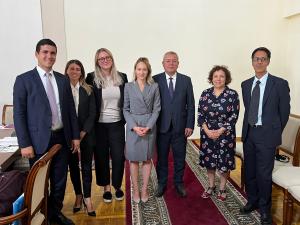Circular economy transformation is a new area of cooperation between the United Nations Economic Commission for Europe (UNECE) and the Government of Tajikistan. Under the overarching leadership of the Ministry of Economic Development and Trade, UNECE together with the UN Tajikistan, and in partnership with national stakeholders, will tailor solutions to make the manufacturing lifecycle of clothes and footwear circular.
In Tajikistan, the garment and footwear sector is vital for the country’s economic development. In 2021, the Tajik textile industry employed 50% (or 9,000 workers) of the total people working in the light industry, 28.9% of people in the garment industry (or 5,200 workers), and 4.4% of individuals in the leather and footwear industry. Tajikistan produces cotton, which could be an important comparative advantage in strengthening the national garment and footwear sector. In 2021, the country exported cotton worth 202.6 million USD (9.4% of total exports), while its garment exports amounted to 18.3 million USD.
However, the continuation of a business-as-usual approach in the sector in Tajikistan and in Central Asia more broadly could lead to irreversible environmental damage and reduce socio-economic growth prospects. The region has already witnessed one of the worst ecological disasters with the near disappearance of the Aral Sea, where cotton farmers used to draw excess water from its main sources, the Amu Darya and Syr Darya rivers. Worldwide, the garment and footwear sector creates around 90 million tonnes of waste. Further, 87% of textiles are discarded or burned each year, costing 100 billion USD. A total of 98 million tonnes of non-renewable resources are used per year - including oil to produce synthetic fibres, fertilisers to grow cotton, and chemicals to produce, dye, and finish fibres and textiles.
Adopting circular economy approaches can help address these risks and steer the sector onto a more sustainable path. A circular economy is a system in which economic activity is decoupled from the consumption of finite resources. UNECE works to accelerate this circular transition in its programme countries, creating economic benefits like cost savings, new business opportunities, more jobs, and to reduce environmental impact.
However, many countries, particularly emerging economies, cannot fully realize these gains due to capacity limitations. Since the circular economy requires a cross-cutting approach and interconnectivity in a national economy, it is necessary to clearly identify the priority sectors in which circularity can be mainstreamed. Within the UNECE region, the garment and footwear sector, especially in Central Asia, holds particular potential for this shift.
The National Development Strategy of Tajikistan 2030 projects further strengthening the sector by creating agro-industrial clusters and enterprises for the complete processing of cotton fibre, leather raw materials, and cocoons. Considering the expected growth and the environmental concerns of garment and footwear production in Tajikistan, there is an immediate need to limit the current linear business models and instead develop the regulatory framework that enables a circular transition.
Tajikistan has already started exploring the concept of a circular economy in some of its national strategies, which are currently being formulated. For instance, the National Strategy on Waste Management, led by the Committee for Environmental Protection, and the National Strategy on Green Economy, led by the Ministry of Economic Development and Trade, are two key strategies in which circularity can be further incorporated.
To help accelerate the shift, the Ministry of Economic Development and Trade, with the support of UNECE, organized the First National Policy Dialogue on the Circular Economy in Tajikistan - Improving Traceability of Products Along International Value Chains, held in Dushanbe on 6 September 2022. During the event, national stakeholders and international experts discussed strategic priorities and identified policy, regulatory, and institutional challenges affecting the circular economy transition.
Ms. Sezin Sinanoglu, the UN Resident Coordinator in Tajikistan, discussed the transformation needed for the circular economy, stating “We need to shift from a take, use, and discard mode of thinking to a reduce, reuse, and recycle. Adopting a circular economy should be a whole of government undertaking in partnership with the private sector and communities.”
The findings of this discussion will be included in a national gap analysis and will help shape a national action plan for the circular economy transition. This action plan will also include a traceability system of circular garment and footwear value chains. A list of actions, creation of an effective system of incentives, development of traceability standards, and engagement plans with the business sector and civil society, will be considered in the action plan.
An expansion in circularity, through reuse, repurposing, or recycling, could reduce 33% of the carbon dioxide emissions for textile products. It could also help to reduce air, land, and soil pollution. A circular economy will require transparency and traceability across the value chain, including the data necessary to inform after-use practices such as sorting, remaking, and recycling. Using traceability tools, it will be possible to holistically increase and support circular production processes, business models, and sustainable investments.
UNECE has already developed several tools and supported a number of initiatives to promote the circular economy, including:
-
The Sustainability Pledge, supporting all stakeholders in the uptake of traceability and transparency approaches in the garment and footwear sector;
-
Policy Recommendation n.46, identifying a set of measures to advance traceability and transparency for circularity in garments and footwear;
-
A UNECE pilot project developing a blockchain system for traceability and due diligence in the cotton value chain, from field to shelf.
The National Policy Dialogue in Tajikistan is part of a UNECE project “Accelerating the transition to a circular economy in the UNECE region”. Project outputs and deliverables will be presented and communicated via the UNECE stakeholder engagement platform CIRCULAR STEP to scale up and replicate successful circular practices in the UNECE region.


